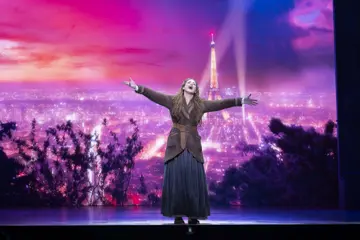WAMi-winning drone-doom metallers Drowning Horse are about to land their eponymous debut album, and quite some impact it's expected to have. As rough cut, preview copies suggest, the finished article will be heavier than an iron gorilla eating uranium peanuts, although it's slow, brutal, sometimes atonal nature is not likely to unite all WA metal fans under one happy banner.
“The funny thing about winning the metal WAMi,” confesses guitarist McGrath, “is that Drowning Horse had never played a metal gig; ever. We don't even consider ourselves a metal band, even though we probably are in terms of what metal is.”
Having emerged from the remnants of hardcore band Defeat, the band's conceptual rebirth as Drowning Horse was enforced by pragmatism as much as it was inspiration. “Defeat was sort of like a fast punk band. We had elements of doomier stuff, but our drummer at the time moved to Melbourne. He was a really good drummer and we struggled to replace him. So we decided [to] just focus on the heavier stuff,” McGrath reveals in between sips of Rogers. “That was the original line-up: Defeat with a new drummer, James [Wills]. Then our bass player moved to Melbourne as well, so we replaced him and it just grew from there, but from the beginning it was always going to be the style that it is.”
Both Brendan and second guitar player Mickey Larkins remain active within the local punk scene as members of War Threat. Brendan also plays in Helter Skelter and Mickey, until recently, was part of the now disbanded Suffer. “We all go to punk shows all the time,” Brendan continues.
Don't miss a beat with our FREE daily newsletter
But aside from expediency, there are also certain attractions to playing at super-slow tempos: “It just sounds better slow,” McGrath says. “It fits what we're going for. You can't really convey what we're trying to convey if you play fast. It's supposed to be slow and depressing and oppressive and really loud.” Which begs the question: what are Drowning Horse trying to convey? “It's hard to put into words,” he ponders. “I guess the way we see the world collectively as a five-piece – we all see it fairly similar. Our reaction to everything that we see in our certain way is to write music and play music the way we play it. I guess ultimately we have a fairly pessimistic outlook on everything. I guess that's reflected in our music, but we're not necessarily pessimistic people; people who are always bummed out or anything. There's definitely a way we perceive the things people do, the way people act and the world in general that doesn't sit well with us.”
It's not hard to see what he means. In the street opposite the Windsor Hotel where we sit, a bulky figure pushing a pram suddenly sets on another pedestrian, shoving them into a flower bed. Nobody bats an eye. Just another common occurrence, in what's supposed to be one of Perth's quieter suburbs. Although this type of incident may not be exactly what the band had in mind. Whilst there are themes to the music and lyrics, McGrath remains coy as to actual meanings. “They're on pretty specific topics, but Kim [McConchie] is very cryptic about the way he writes his lyrics. I kind of like that. On the record there's no lyric sheet; it's up to your interpretation. But I don't want to draw a link between Drowning Horse and political agendas.”
Given that most of the words on the album are grossly distorted by vocalist McConchie's howl, those themes will likely remain a mystery. Having begun recording in July 2011, it's been a long, slow push to fruition. “The main holdup was that we didn't have enough money to release it. We wanted to press it as a [vinyl] LP and that's expensive. Luckily we got Scott from Heartless Robot Productions to help us out. That was one of the big holdups. The other was getting it mastered in the States. That took a long time; back and forth emails for maybe a few months, then you have to send the masters in the post.” The band plumped for US producer James Plotkin as, “he's done a lot of good stuff. He's done Earth records, Sunn 0))) records, he plays in Carnate. He's the right guy for the job, y'know what I mean. He's into that sort of music, he's got the CV for it and he was reasonably priced.”
Speaking of Sunn 0))), Drowning Horse will be supporting the influential Seattle band as well as Pelican in October and post-metallists Russian Circles for a second time this September. “Really psyched to see them again,” McGrath enthuses. However, when asked what new elements Drowning Horse add to the templates etched out by bands such as Sunn 0))), his response is fairly modest. “Not much. We're not trying to break any new ground or anything. We're just playing because it's what we feel like playing. I don't think we're recreating the genre or redefining it or anything. I think we're just playing what we want to play. We're definitely borrowing a lot of aspects and we try and mix a lot of different subgenres within that broader genre.”
They may not be re-defining “heavy”, but they're certainly exploring its boundaries. What does he think of Roger Glover of Deep Purple's comment that “heavy isn't about volume, it's about attitude?”
“It's not about volume, but it's definitely about riffs,” McGrath insists. “When I think of 'attitude' I think of glam metal. Most of us come from a punk background so we're anti showing off. Drowning Horse for the most part approaches music the same way as when we were in punk bands. No bullshit that's more than necessary, the bare essentials. No rock-star shit.”
Having embraced the genre's heaviest elements – doom riffs and overwhelming drone – with a punk no frills/no excess/no showboating mindset, the final product is still one that's likely to alienate a number of metal traditionalists. I suggest to Darren that one advantage of playing the weird, improbably loud metal that Drowning Horse do is that any heckles directed at the band will be lost under a sea of sound. “Ha, that's the thing. Make it so loud that you're forced to do nothing except listen to the music. Never had any super-bad reactions. I've seen people walk out. I've seen lots of people walk out. I've heard of people feeling sick and stuff but I don't know how much of it's true. I mean it's pretty loud, but it's not unbearable. We had a couple of really bad reviews, but that's always gonna happen. Someone said that we're the most self-indulgent band he'd ever seen. That actually cut quite deep because it's exactly the opposite of what trying to achieve.”
Self-indulgence: it's a presumptuous, old tag commonly employed by wizened rock hacks to dismiss material they can't empathise with and artists whose intentions they don't bother to understand. “Whatever,” shrugs McGrath. “We'll play louder next time.”















